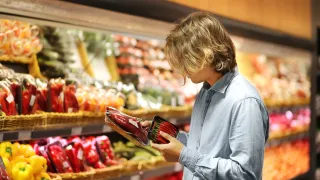The past years have been a rocky road for consumers. The ongoing environmental crisis has been accompanied by two largely unpredictable events: the global pandemic and the war in Ukraine. Amidst geopolitical and financial turbulence, consumers are sparing yet willing to explore.
Consumers have had to rethink their spending due to inflation caused by rising energy prices and supply chain disruptions. The consumer confidence index hit a record low in the EU in July 2022. Concrete energy-saving measures impact households. Emergencies appear one after another and long-term planning is difficult.
At the same time, technology is creating new opportunities, from metaverse storefronts to circular commerce and hybrid gatherings. Consumers have reflected on their values and lifestyles during the pandemic. Despite the stormy situation, several business renewal opportunities are emerging for resilient organizations adapting to the volatile landscape:
1. Budget and private label products flourish
The dust had not even settled in the post-lockdown world as consumers faced a new challenge: a rapidly rising inflation tied to the energy crisis. Consumers are thrifty with their money and re-evaluate their spending, especially on energy and food. Retailers are pressured to increase the amount of both budget and private label products. A recent European survey study found out that private label loyalists (consumers purchasing private label products over 75% of the time) now equal those of national brand loyalists. Private labels make up 35% of total fast-moving consumer goods sales (FCMG) in Europe. The financial worries of consumers will also be reflected in marketing campaigns.
2. Metaverse offers new touchpoints
Brands are experimenting with selling virtual goods to users' avatars. Digital identities, personalized for example with exclusive clothing and accessories, are increasingly important especially for younger generations. Fashion houses are already designing entirely virtual product portfolios, and major companies launch digital stores in virtual worlds like Decentraland, Roblox, Fortnite, Voxels and Sandbox.
Non-fungible tokens (NFTs) have been a key technology enabling the buying and selling of virtual goods in the metaverse. For example, the Gucci Garden in Roblox attracted 19 million visitors and has now been followed by the virtual neighbourhood Gucci Town. In the future, avatars and their purchases may be used more easily across platforms instead of world-specific use.
3. Physical experiences are reignited
Pandemic-drained consumers are eager to explore out-of-home experiences again. The bottled-up demand for physical and social life is revitalizing many industries, such as travel, entertainment and sports. Consumers have learnt to value hybrid and virtual options during the past years, and future success requires building enjoyable omnichannel experiences. Top-notch hygiene standards, contactless interfaces and smart crowd management are the new normal. However, the staff shortages, especially in the travel industry, have left the consumer experience behind pre-pandemic standards.
4. Soul-searching has changed values
According to a survey study VTT conducted with YIT and Finnish Textile & Fashion, 40% of Finnish adults believed that the time of the pandemic has changed their values. The experience of value transformation was common, especially among women. International studies have also paid attention to soul-searching during COVID-19. People have new ideas about their personal and professional lives, which has led to the Great Resignation phenomenon seen in the US, Europe and beyond, for example. People look for opportunities that provide a sense of purpose and fulfilment. Time for oneself and flexible working policies are appreciated.
5. Effortless everyday sustainability is the new norm
Sustainability is not something that is added on top of a product or service anymore. It is a starting point. Brands have to consider their impact on everything and adopt end-to-end zero-carbon strategies. Especially younger consumers place sustainability over consumerism. A global study of 16,000 consumers conducted in February 2022 found that 51% of respondents considered environmental sustainability more important to them than it was a year ago. The winning strategy is combining sustainability with the already dominant convenience trend, making everything as easy and smooth as possible, which leads to offering effortless sustainable products and experiences as the norm.
VTT’s Future Customer experts use strategic foresight and customer research to uncover new strategic options for companies seeking sustainable growth. Read more about our strategic foresight services.
If you haven’t read VTT’s Megatrends report: Leading towards a better future yet, click here to download your copy. The report includes an overview of some the essential megatrends impacting businesses in the upcoming decade in easily digestible – yet thoroughly researched – overview to help you as a decision-maker to crystallise your direction for the upcoming decade.
Sources
CB Insights (2022): 12 Tech Trends To Watch Closely In 2022
Euromonitor (2022): Voice of the Consumer: Key Insights 2022
Frost & Sullivan (2022): Top Trends for 2022 Impacting Industries, Governments and Society
IBM (2022): Balancing sustainability and profitability
IRI (2022): Private Lables: Hiding in Plain Sight
VTT, YIT and Finnish Textile & Fashion (2022): Kuluttaja korona-aikana ja sen jälkeen
Keep reading: Hartwall’s future radar identifies and helps fill organisational gaps before they emerge
Today’s fast-paced business environment demands a proactive business strategy that anticipates and quickly responds to future changes. In order to futureproof their business, Hartwall used the VTT FutureRadar tool to identify emerging organisational gaps and the technology to fill them.





